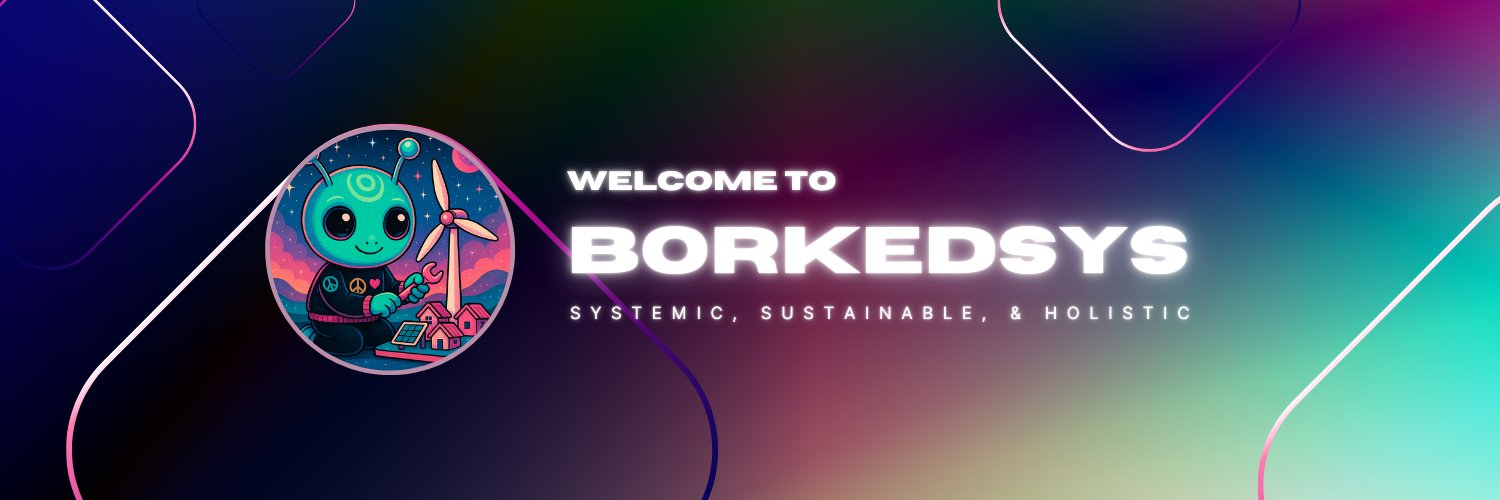
borkedsys
@borkedsys
Earth 1.0: Bugs include poverty, greed, and artificial scarcity. Suggesting a full-system upgrade to a Resource Based Economy. No patches, just solutions.
1/ 🌍 Systemic issues are often invisible to many because they’re deeply embedded in the systems that govern our lives. From economic inequality to environmental destruction, these problems aren’t isolated, they’re all interconnected. Let’s break it down.
We need more people willing to get off the paths that were prescribed for them and explore new ones instead.
The powers that be don’t run the world, they manage it for extraction. There’s a difference. Running a world means thinking in terms of systems, sustainability, and life. But this low-tier capitalism? It’s toddler logic. Little boy games in the crib of existence. Time to grow up.
To those in favor of UBI... I’d love to hear your thoughts on this... Given how policy is shaped today, how do we navigate the likelihood that UBI would arrive in a tightly monitored, conditional, and digitally controlled form Genuinely asking, not debating.
Markets don't respond to need, they respond to money. So if a medicine saves lives but doesn’t generate profit, it disappears. In a system like this, even longevity itself becomes a class privilege.
In rich nations, the poor still die young. Not because medicine is missing, but because access is conditional. Life expectancy tracks income. The lower the class, the shorter the life. That’s not nature. That’s economics acting through human bodies.
If your health only matters when it’s profitable, then sickness becomes an income stream. This is why wellness is unaffordable and crisis care is lucrative. The system doesn't want you healthy, it wants you paying to survive.
Stress is a slow violence. Poverty, overwork, debt, insecurity, all produce biological damage over time. Capitalism creates chronic stress as a feature, not a flaw. It ages the poor faster. It kills them earlier. But never makes that link visible.
In a capitalist system, life is gated behind a paywall. Food, water, shelter, safety, rest, the basic ingredients of health aren’t distributed by need, but by purchasing power. If you can't pay, you don't get to live well. Sometimes, not at all.
Life expectancy isn’t just biology. It’s economy. Not how cells age, but how the system treats the body. Capitalism doesn’t kill directly. It creates the conditions that do, then sells survival back to you, at a price you may never afford.
Our inability to forgive keeps us trapped.
To reclaim the self is to see how deeply it’s been outsourced. To deprogram the need to be seen through what we buy. Until we dislodge the market from culture, we will keep mistaking branded selves for human ones.
They didn’t just sell to you. They sold you back to yourself. Fragmented. Packaged. Upgraded. And now you must consume just to feel whole again.
Corporate power doesn’t require brute force. It uses design. It programs the visible world until even resistance is aestheticized. This is market totalitarianism, made beautiful.
When identity becomes a commercial function, the self fragments. We stop asking who we are and start managing how we’re perceived. The result isn’t authenticity, it’s selfhood as optics. Selfhood as strategy.
You’re told to “be yourself.” But your options are all catalogued. Uniqueness is permitted, so long as it’s profitable. If it can’t be marketed, it’s made invisible. That’s not freedom. That’s filtered autonomy.
Where symbols once helped us make sense of being human, they now make sense of market potential. Every sacred gesture converted to a branding opportunity. The psyche is no longer private. It’s real estate.
Culture once emerged from below, woven through time, struggle, and shared myth. Now it’s seeded by design. What you wear, say, love, or aspire to has been preloaded. This isn’t culture. It’s behaviorally-engineered compliance.
Corporate logic colonized the symbolic layer of life. It took story, belonging, and pride, and rewired them for profit. Your rituals are ads. Your personality is product metadata. The self is now a monetized interface.
The market doesn’t just sell products, it sells meaning. It sculpts desire, curates identity, and manufactures aesthetics optimized for consumption. You don’t live in a culture. You live in a branded simulation of one.